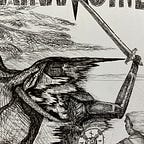Need an answer to modern socialism? Look back 300 years to John Locke.
Last time, I wrote about how Jean-Jacques Rousseau was the true predecessor of communism. His view on society was that man is naturally solitary, the first societies had no concept of personal property, and that when someone thought up the idea of declaring property his own, he was oppressing everyone else.
I stopped there, but neglected to mention why Rousseau is wrong or why John Locke had already come to the correct conclusion. So now I’ll talk about that.
In John Locke’s view, people will come together into societies naturally (as anyone who lived through the Great Lockdown of 2020 will understand). Locke goes on to explain that people have always had the idea of personal property, and that it is a true one. When we exert energy to obtain something that no one else has obtained (or that someone has obtained and has neglected to use), it becomes our property. This concept makes total sense; even kindergarteners fighting over toys understand this (“You stole it!”)
Locke then describes how societies with the concept of personal property created civilization: people declared real estate their own and built houses and farms on it using materials they owned. Later, the concept of trade came along, and eventually, the concept of money. Government was created by the people later in order to protect people’s property from theft. This government arrangement worked as well to protect the rich, as it did to protect the poor from violation by the rich.
Rousseau hated civilization; Locke knows it to be mankind’s best creation.
